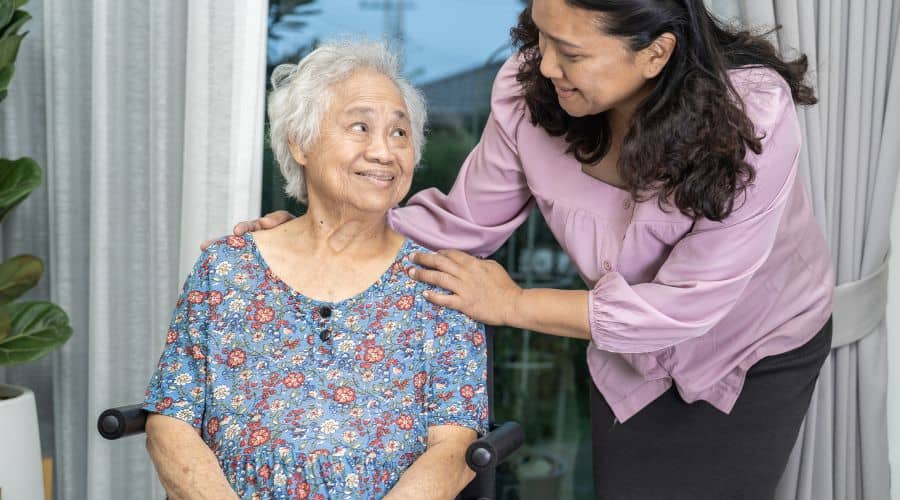We all want what’s best for our parents and at some point there will come a time where we will know what’s best for them, more so than they know themselves.
You might even come up against some resistance. An aging parent may be in denial about their state of health as they begin to lose capacity.
So, what do you do? What are the rules around putting a parent into a nursing home against their will?
In This Article
- Putting a Parent in a Nursing Home Against Their Will in Australia
- When Is It Okay to Assist a Parent or Spouse Into a Nursing Home?
- Who Has the Right to Put Someone in a Nursing Home?
- How to Deal With the Guilt of a Parent or Spouse in Care?
- Where to Get Advice When Helping Someone Move Into Care?
- Frequently Asked Questions
Putting a Parent in a Nursing Home Against Their Will in Australia
Putting a parent in a nursing home against their will can be a difficult decision. It’s difficult enough to watch a person move into care as it is, let alone when they resist.
There are likely going to be feelings of guilt, as you might consider yourself responsible for the care of your parents or spouse, just as they once cared for you.
But often, they are going to receive a higher quality of aged-specific care from a professional nursing home than they would from you. Especially if you have other responsibilities, such as children and work, or are unable to be for them there geographically.
However, it’s important to know when you are legally allowed to move someone into care.
When Is It Okay to Assist a Parent or Spouse Into a Nursing Home?
It’s okay to assist a parent or spouse into a nursing home when they consent and are willing to move in.
But what if they are not willing?
It is not legal to put a parent into a nursing home against their will in Australia, regardless of whether you are a doctor, social worker or family member.
However, if they have lost capacity, then you can assist with moving a parent or spouse into a residential aged care facility, provided you have the authority and right to do so.
Who Has the Right to Put Someone in a Nursing Home?
It’s important to understand who has the legal right to put someone in a nursing home.
If a parent, spouse or other loved-one has lost the capacity to make their own decisions, then you may have the right to assist with their transition into care if you are their:
- Enduring Power of Attorney (Medical); or
- Legal Guardian/Administrator (Medical).
An Enduring Power of Attorney (EPOA) is a legal document put in place that allows another person to make decisions on their behalf, should they be unable to do so themselves. Importantly, an EPOA can only be put in place whilst the person giving the power has capacity.
If a loved-one has lost capacity and they had not previously appointed an EPOA, then an appointed guardian (usually a family member or friend) can be a decision maker. To become a guardian, you will need to be appointed as a guardian for a particular person by the guardianship board or tribunal.
How to Deal With the Guilt of a Parent or Spouse in Care?
Dealing with the guilt of a parent or spouse in residential aged care can be tough. You no doubt feel an obligation, but at what cost?
The best way to deal with the guilt or transitioning a loved-one into care includes:
- Look Around – Visit a range of aged care facilities to give you a sense of what would be best for a parent or spouse. You may decide to engage the services of a Placement Consultant to assist with this.
- Respite Care – Arranging respite care at the residential aged care facility that they will be moving into can help them get used to their surroundings prior to becoming a permanent resident.
- Proper Care – Keep in mind that your loved one is likely receiving better care from a nursing home than you could provide them with.
- Regular Visits – Visit your loved one often and encourage other family and friends to visit too. Try to arrange times where more than one of you can be there at the same time to provide greater familiarity. And, on days you can’t be there, make an effort to phone to check in, even if for only 10 minutes.
- Get to Know Staff – Introduce yourself to the staff and learn their names. These are the people who will be providing the day-to-day care of a parent or spouse – it’s important to form a relationship with them.
These are a handful of ways that can alleviate the guilt and stresses associated with putting a parent into nursing home care. Getting advice prior to beginning the aged care process can also help.
Read This Next: Who Pays for Nursing Home Care in Australia?
Where to Get Advice When Helping Someone Move Into Care?
Knowing where to get advice from when helping someone move into care can mean the difference between getting it completely right or completely wrong.
Importantly, when it comes to covering the costs of aged care, the legalities of aged care and finding the right home for your parents, it’s often best to not seek advice from someone who works at one of the aged care homes you are considering.
An admissions officer or nursing home staff member can help you understand the specifics of the care facility they work at, but they do not specialise in providing financial or legal advice.
The first step is to have an assessment completed by the Aged Care Assessment Team (ACAT) who will recommend when full-time residential aged care is required. You can check if you or a loved one is eligible for an assessment here.
After that, there are three main types of professionals that can assist when helping someone move into care. These are:
- Placement Consultants
- Estate Planning Specialist Solicitors
- Aged Care Specialist Financial Advisers
A Placement Consultant is a person that has intimate knowledge of aged care homes in your area and which one would be best suited to your loved-one based on your criteria. While there is a fee for an aged care placement consultant, it can save you plenty of time and provide a better chance of finding a nursing home that meets your parents’ needs.
The role of an Aged Care Specialist Financial Adviser is to determine the affordability of aged care, including ensuring your loved-one can cover the costs of aged care throughout their life. They will also recommend financial planning strategies for the optimal way to fund aged care and calculate the pros and cons of keeping or selling the family home, so that Centrelink Age Pension payments are maximised and aged care costs are minimised.
Aged Care Financial Advisers charge a fee for their service, but the financial benefits of seeking advice from the right adviser will almost always outweigh the costs of advice.
At Core Value Aged Care Advice, we will help you navigate the complexities of aged care and find the best financial solutions for your family. If you have any questions or concerns regarding your situation, please call us on 1300 944 011 to speak with an expert aged care adviser today.
An Estate Planning Specialist Solicitor can guide you to make sure the right person is making decisions on behalf of the aged care resident and explain what will happen in the event that they were to pass away.
Frequently Asked Questions
Listed below are some frequently asked questions in relation to putting a parent into a nursing home against their will in Australia.
Can a Person be Forced into a Nursing Home in Australia?
A person cannot be forced into a nursing home in Australia against their will. A person must give their consent to transition into permanent care. However, if the person has lost capacity, then an Enduring Power of Attorney (Medical), or an appointed guardian, can transition a person into care when it’s in the person’s best interest – even if they resist.
What to do When an Elderly Parent Refuses to Move into Aged Care
If an elderly parent refuses to move into aged care you are unable to force them. However, if they have lost capacity and have been assessed as needing full-time care, then you will have the right to help transition them into residential aged care.
You might consider explaining to them the benefits of full-time residential aged care and give them comfort that you will continue to visit and stay in touch with them.
Respite care can also allow both of you to experience what it would be like after helping someone into care, rather than going directly to a permanent arrangement.
Are You Legally Responsible for Your Elderly Parents?
In Australia, you are not legally responsible for the financial or health wellbeing of your elderly parents. However, you should take the time to understand the rules around elder abuse, as well as the financial commitments you may find yourself obligated to if you sign off as guarantor on the aged care contract.
You might also like:

Hi, I hope you found this article useful.
If you wish to discuss your situation and what strategies may be of benefit please contact us here
Thanks - Shane


